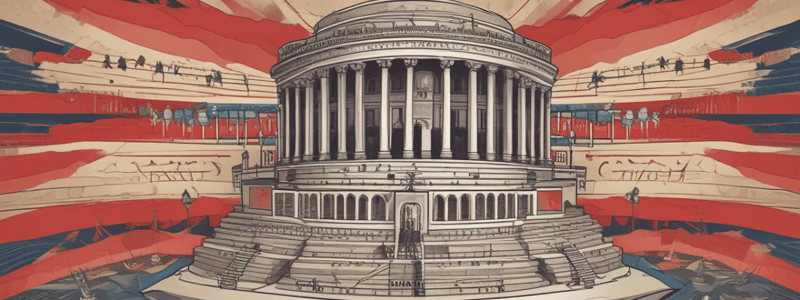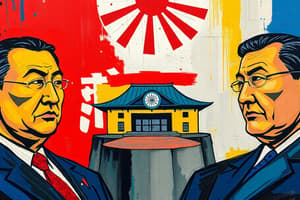Podcast
Questions and Answers
What is the main purpose of the separation of powers in democratic governments?
What is the main purpose of the separation of powers in democratic governments?
- To give absolute power to the legislative branch
- To make the executive branch the most powerful
- To divide the government into only two branches
- To ensure a system of checks and balances (correct)
Which branch of government is responsible for making laws?
Which branch of government is responsible for making laws?
- Executive Branch
- Judicial Branch
- Legislative Branch (correct)
- Administrative Branch
What is the role of the judicial branch in the system of separation of powers?
What is the role of the judicial branch in the system of separation of powers?
- To enforce laws
- To appoint government officials
- To make laws
- To interpret laws and ensure they are applied fairly (correct)
What power does the legislative branch have regarding the budget?
What power does the legislative branch have regarding the budget?
What is the role of the executive branch in the system of separation of powers?
What is the role of the executive branch in the system of separation of powers?
What is the power of the legislative branch regarding government officials?
What is the power of the legislative branch regarding government officials?
What can the executive branch do to a bill passed by the legislative branch?
What can the executive branch do to a bill passed by the legislative branch?
What is the primary role of the judicial branch?
What is the primary role of the judicial branch?
Why is the separation of powers important?
Why is the separation of powers important?
What is an example of a country with a system of separation of powers?
What is an example of a country with a system of separation of powers?
What is the main benefit of the system of checks and balances?
What is the main benefit of the system of checks and balances?
What is the role of the executive branch in the system of separation of powers?
What is the role of the executive branch in the system of separation of powers?
What is the primary purpose of the separation of powers?
What is the primary purpose of the separation of powers?
Which of the following countries has a similar system of separation of powers as the United States?
Which of the following countries has a similar system of separation of powers as the United States?
What is a benefit of the separation of powers in terms of individual rights and freedoms?
What is a benefit of the separation of powers in terms of individual rights and freedoms?
Flashcards are hidden until you start studying
Study Notes
Separation of Powers
- The concept of separation of powers is a fundamental principle in democratic governments, dividing government powers and responsibilities among different branches or institutions.
- The purpose of this division is to prevent any one branch from becoming too powerful and to ensure a system of checks and balances.
Three Branches of Government
- The legislative branch is responsible for making laws, composed of a parliament or congress with elected representatives.
- The executive branch is responsible for enforcing laws and running the government, headed by the president or prime minister.
- The judicial branch is responsible for interpreting laws and ensuring they are applied fairly, made up of courts and judges.
How Separation of Powers Works
- Legislative branch makes laws by proposing, debating, and voting on bills, and has the power to approve or reject the budget and impeach government officials.
- Executive branch enforces laws by implementing and administering policies, and has the power to veto bills and appoint judges and officials.
- Judicial branch interprets laws by hearing cases and making decisions based on legal principles, and has the power to declare laws or actions unconstitutional.
Importance of Separation of Powers
- Prevents abuse of power by dividing powers among different branches, protecting citizens' rights and freedoms.
- Provides checks and balances, allowing each branch to check and balance the actions of the other branches.
- Ensures accountability, holding each branch responsible for its actions and preventing overstepping of authority.
- Promotes stability and efficiency in government, allowing each branch to focus on its specific role and expertise.
Examples of Separation of Powers
- United States: Three branches of government, with the Congress (legislative), President (executive), and Supreme Court (judicial), each with defined powers and responsibilities.
- United Kingdom: Separation of powers with the Parliament (legislative), Prime Minister (executive), and courts (judicial), although not as strict as in the United States.
- India: Separation of powers with the Parliament (legislative), President (executive), and Supreme Court (judicial), each with defined powers and responsibilities.
Studying That Suits You
Use AI to generate personalized quizzes and flashcards to suit your learning preferences.




